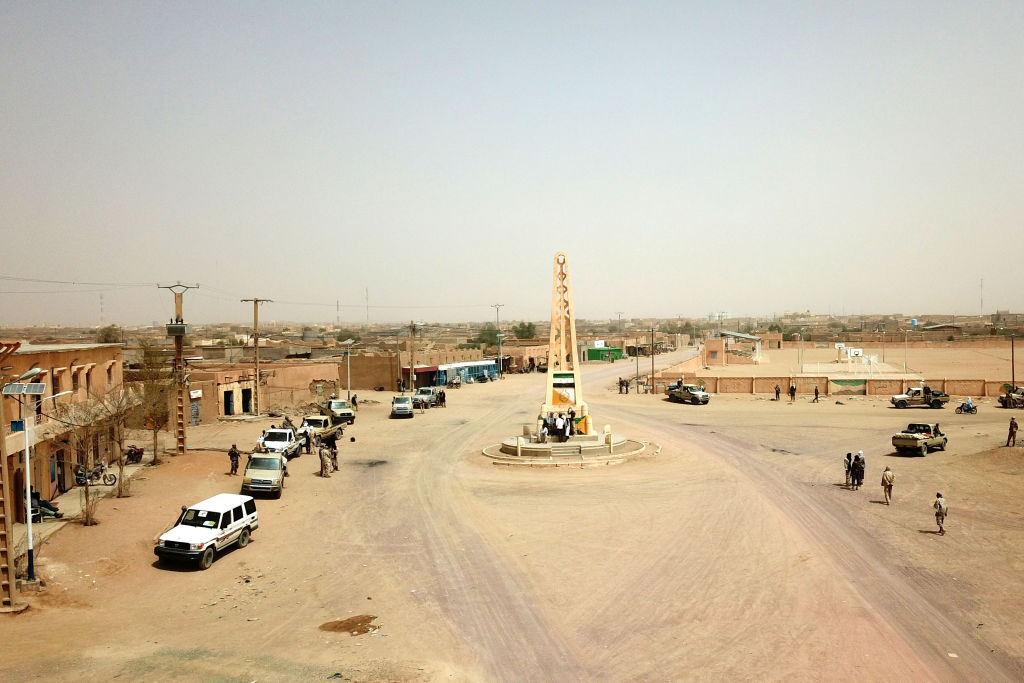ADF STAFF
For years, Mali’s government and army have had virtually no presence in the strategic northern town of Kidal. Since he came to power in a 2020 coup, however, Col. Assimi Goïta has made clear his desire to retake the Tuareg rebel stronghold and reestablish Mali’s territorial sovereignty.
The recent withdrawal of the United Nations peacekeeping mission, MINUSMA, has triggered a security vacuum and a race to seize control of Mali’s vast northern desert lands.
The combatants are the military junta’s troops, Tuareg rebels and several extremist militant groups. The prized centerpiece of their conquest is Kidal, historically a wellspring of multiple insurgencies that have spread throughout the Sahel region.
“A conservative estimate is that the Malian junta and the authorities are only in charge of about 20% of national territory,” BBC Africa analyst Beverly Ochieng said on a November 23 podcast.
“So, it’s not just an issue in the north, it’s about the entire country.”
A large Malian army convoy along with Russian Wagner Group mercenaries and aerial support began moving into the north in October, setting up in the village of Anéfis, about 110 kilometers south of Kidal.
Along the way, the Malian convoy fended off attacks by a coalition of Tuareg separatist factions called the Permanent Strategic Framework (Cadre stratégique permanent, or CSP), which moved into MINUSMA’s Kidal base when peacekeepers left on October 31.
Acting on the advice of the Wagner Group, the Malian junta in June had demanded the exit of MINUSMA’s nearly 15,000-strong force. By late October, the deteriorating security situation forced the U.N. to accelerate its withdrawal from Kidal, which had been planned for mid-November.
“We had to leave because of serious security conditions that were putting the lives of the peacekeepers at risk,” MINUSMA spokesperson Fatoumata Kaba told the BBC. “The principle that has been adopted is that all MINUSMA bases are to be handed over to the Malian civilian authorities, and wherever that has been possible, we have done so.”
Malian forces struck Kidal, targeting the former U.N. base and other sites with a series of drone attacks on November 7. Kidal Mayor Arbakane Ag Abzayack told The Associated Press that the town’s deputy mayor was among at least 14 victims.
“Six people, including children, were killed by airstrikes by the Malian army,” a health worker told Agence France-Presse (AFP).
The rebels cut telephone lines and left Kidal when Malian troops entered on November 14. A Malian officer told AFP that the army controlled Kidal’s airstrip and the U.N. base.
While the junta declared a symbolic victory, the CSP claimed it withdrew “for strategic reasons” after having “for several days halted [the army’s] advance by inflicting great human and material losses.”
“The fight continues,” the group said in a statement. Goïta promised the same in a social media message.
The issue for Mali’s broadly extended army now becomes how long it can retain control of the remote northern territories it has seized.
Renewed fighting in the area has forced thousands from their homes and dramatically increased the death toll, according to the Armed Conflict Location and Event Data Project, which recorded about 400 casualties, nearly half of them civilians, between August and mid-October.
Analysts say drawn-out fighting in northern Mali likely will fuel recruitment for Tuareg separatists and extremist terror groups.
“The CSP has accused the army and its Wagner allies of committing atrocities against civilians, notably in Ersane, a village halfway between Gao and the town of Kidal, where 17 people were allegedly killed execution-style and their corpses rigged with explosives,” Crisis Group reported on October 13.
Malian authorities denied the accusations.
Ochieng said the situation in Kidal is “quite fluid and tense” with civilians fleeing south to Menaka and north to Algeria.
“People are carrying mattresses, they’re carrying anything that they can to be able to get to safety,” she said. “People might either feel the need to join some of the armed groups as a way of self-defense or a way of survival.”
Ochieng said the effectiveness of the Mali junta’s strategy of establishing its presence and consolidating power around abandoned MINUSMA bases remains to be seen.
“The U.N. bases have become the strategic place for them to put their presence or for them to deploy forces,” she said. “And not in the far-flung areas, which especially near the borderlands, are impacted by violence.
“Obviously you cannot have an army in every place, especially in an area like the Sahel, where there’s volatility in vast parts, not just within the country, but outside the borders.”

